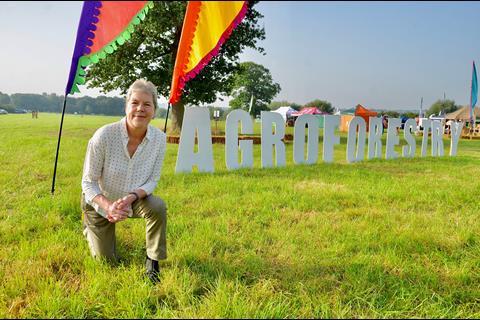Farmers at inaugural Agroforestry Show hear how the practice can protect crops, livestock, soils, rivers, biodiversity, and climate
More than a thousand people attended the UK’s first ever Agroforestry Show to learn how trees can help growers protect crops, while tackling climate change and biodiversity loss.
Organisers the Soil Association and Woodland Trust said agroforestry was a “win-win” for boosting crop health and progressing towards environmental targets.
Held on 6-7 September amid unseasonably high temperatures, the UK’s first ever Agroforestry Show featured various sessions on how and why trees are key to protecting food production, while mitigating climate change and guarding against biodiversity loss.
The show saw farmers, foresters, researchers, environmentalists, and policy makers sharing insights and advice on how to help farm businesses benefit from trees.
Soil Association chief executive Helen Browning hosted the event at Eastbrook Farm, an organic livestock farm in Wiltshire. There were two days of workshops and talks covering how agroforestry – combining trees with either crops or livestock – can help farms to protect crops, livestock, soils, rivers, biodiversity, and climate.
Browning, who has been running an agroforestry project at the farm for seven years, said: “The extraordinary number of people here have shown there’s a real thirst for knowledge on agroforestry from both the traditional forestry and farming sectors.
“Farming with trees is clearly going to be a huge part of our futures, and never has that been more evident than this week where we’ve experienced 30-degree heat in September. If our farms are going to be resilient to face the future with happy and healthy animals and crops that grow well then trees are going to be a big part of that, as well as being very useful for reaching our environmental goals. It’s a win-win.
“There needs to be universally available help for farmers and we need to change the rules of the game so that tenant farmers in particular aren’t stuck in a system that doesn’t allow land-use changes.
“We have gone beyond a consensus that trees are a good thing, into the practical detail of how to do it. So, it is no longer about the ‘why’ or ‘whether’ but into the ‘how’ we do it – whether that’s knocking down the barriers such as tenure and policy, or into the specifics of how, together, we crack on with it successfully in a cost-effective way.”
After a recap on the limited agroforestry funding options currently available to farmers in a session with UK government representatives, many farmers called for the investment and policy changes needed to help them make this long-term commitment. There were particular concerns for tenant farmers.
Although none of the politicians were able to give details of any new schemes to boost uptake, the policymakers were said to be positive about supporting agroforestry to help deliver benefits for both food production and the environment.
Woodland Trust CEO Darren Moorcroft closed the show by saying: “The UK now needs to reach the tipping point to take us from a really powerful set of early adopters into a mainstream conversation.”
He added: “It was encouraging that we had representatives from the UK government and all three devolved administrations speaking yesterday sharing their common beliefs that agroforestry should have a key role in future policy development.
“It is up to us all to help support this by sharing our practical experiences so that governments from across the UK develop policy frameworks that will adequately support the establishment and maintenance of a wide diversity of agroforestry systems. This includes the frameworks to support new markets for both the services and products delivered via agroforestry.”





